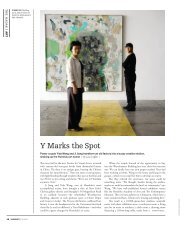The Scholarship of Teaching and Learning: TheoryâPractice - NAIRTL
The Scholarship of Teaching and Learning: TheoryâPractice - NAIRTL
The Scholarship of Teaching and Learning: TheoryâPractice - NAIRTL
Create successful ePaper yourself
Turn your PDF publications into a flip-book with our unique Google optimized e-Paper software.
<strong>The</strong> <strong>Scholarship</strong> <strong>of</strong> <strong>Teaching</strong> <strong>and</strong> <strong>Learning</strong> 3<br />
<strong>The</strong> SoTL takes scholarly approaches to teaching <strong>and</strong> learning to<br />
another level <strong>of</strong> rigor <strong>and</strong> engagement by disseminating pedagogical<br />
research in peer-review contexts. In practice, the SoTL can be demonstrated<br />
in a variety <strong>of</strong> ways including the development <strong>of</strong> a teaching<br />
dossier, development <strong>of</strong> a learning-centered course syllabus, curricula<br />
<strong>and</strong> classroom research projects, team-teaching projects, peer-interview<br />
<strong>of</strong> exemplary curricula <strong>and</strong>/or teaching practices, pedagogical grant<br />
applications <strong>and</strong> manuscript publications, curriculum development<br />
initiatives, program evaluation projects, <strong>and</strong> faculty development<br />
initiatives. <strong>The</strong> SoTL is viewed as both an institutional (e.g., providing<br />
adequate support strategies) <strong>and</strong> faculty-level (e.g., commitment to<br />
pr<strong>of</strong>essional development) responsibility. Even an institutional commitment<br />
to research, far from being a barrier to improving the quality<br />
<strong>of</strong> undergraduate education, can in fact be brought to bear on the SoTL<br />
(Asmar, 2002; Smith, 1997).<br />
Thus, building on perspectives presented in the literature, an<br />
operational definition for the SoTL we employed in the context <strong>of</strong> the<br />
Faculty Certificate Program is, the on-going pr<strong>of</strong>essional development<br />
<strong>and</strong> dissemination <strong>of</strong> practice-driven curricula <strong>and</strong>/or pedagogical<br />
research in peer review contexts. Three key themes are embedded<br />
within this definition: on-going learning (e.g., through self-reflection,<br />
workshops, collaborative <strong>and</strong> self-directed projects, literature reviews),<br />
practice contexts (focus on issues <strong>of</strong> curricula, courses, classroom<br />
experiences, teaching, <strong>and</strong> student learning) <strong>and</strong> peer-review (e.g.,<br />
dissemination <strong>of</strong> investigation through journals, grant writing, <strong>and</strong><br />
conference presentations).<br />
Enhancing the SoTL in a Faculty Certificate Program<br />
<strong>The</strong> following program development <strong>and</strong> evaluation framework<br />
(see Figure 1) has been employed by educational developers <strong>and</strong><br />
university teachers in various higher education settings (Hubball &<br />
Burt, 1999; Hubball, Clarke, & Beach, 2004; Hubball & Levy, 2004;<br />
Hubball & Poole, in press). This flexible <strong>and</strong> iterative framework was<br />
applied to enhance the theory-practice integration <strong>of</strong> the SoTL in the<br />
University <strong>of</strong> British Columbia FCP context. It takes into account<br />
the institutional learning context <strong>and</strong> integrates a wide range <strong>of</strong> program<br />
development <strong>and</strong> evaluation strategies through action research<br />
methodology.











